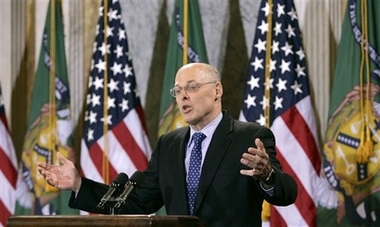Hank Paulson, the US Treasury Secretary, on Wednesday called for a
far-reaching reassessment of US-China policy, urging both nations to rise above
short term disputes to take a "generational" view of their relationship.
US government opposes efforts to punish China
In another development: China, US vow closer energy
ties

Treasury Secretary Henry Paulson
makes his first speech on the international economy since joining the Bush
Cabinet in July at the Treasury Department in Washington, Wednesday, Sept.
13, 2006. [AP] |
In a landmark speech ahead of
his first trip to China as Treasury Secretary, the former Goldman Sachs chairman
and China expert said he would tell his counterparts in Beijing "we want you to
succeed."
Mr Paulson declared "the United States has a huge stake in a prosperous
stable China - a China able and willing to play its part as a global economic
leader."
The US and China share huge areas of mutual economic interest, and
highlighted energy and the environment as two specific issues where the two
countries should work together.
"The biggest risk we face is not that China will overtake the US but that
China will not move ahead with the reforms necessary to sustain its growth," he
said.
The speech implicitly downgrades the importance of the Chinese exchange rate
as a stand-alone issue, setting it instead as part of a necessary shift towards
more market-based economic management.
However, Mr Paulson warned Beijing "the level of anti-trade and anti-China
sentiment in the US is also significant and growing."
He told the Chinese authorities that they underestimated "at China's own
peril" the extent to which the currency issue was "viewed by their critics as a
symbol of unfair competition."
He called on China to press ahead with liberalisation across a broad front,
including financial sector reform, fiscal and regulatory policies to reduce
excess savings, currency liberalisation and enhanced protection for intellectual
property rights.
Mr Paulson praised China's "remarkable" record of economic reform, and said
China already "deserves to be recognised as a leader."
This, he said, is why the US backs plans to give China and other emerging
markets a much bigger say in the International Monetary Fund. He reiterated
former deputy secretary of state Bob Zoellick's phrase that the US wants China
to be a "responsible stakeholder."
However, Mr Paulson said "with leadership comes responsibility."
He urged China to abide by the "spirit and letter" of the rules of the IMF
and said the US looked to China to be its "co-operative partner" in reviving the
Doha round trade talks.
And he suggested these responsibilities "go beyond the economic arena"
including human rights and non-proliferation.
The speech, which appeared to be aimed equally at Beijing and at anti-China
opinion in the US Congress, positions Mr Paulson in the role of honest broker
between the two.
Mr Paulson made an impassioned defence of open markets, declaring
"globalisation and interdependence are here to stay. No nation can turn back the
clock."
He characterised the fundamental division as not one between the US and
China, but between liberalisers in both the US and China, and their
protectionist opponents.
But he warned "I believe that if China does not move quickly to continue
reforming its economy it will face a backlash from other international economic
stakeholders. This backlash would not benefit any of us."
At the same time, Mr Paulson urged the US to do more to ensure that the
benefits of free trade were more widely shared - echoing a recent call by
Federal Reserve chairman Ben Bernanke.
"It is the responsibility of all nations to search for ways to moderate
income disparities and help those who lose their jobs to international
competition," Mr Paulson said.